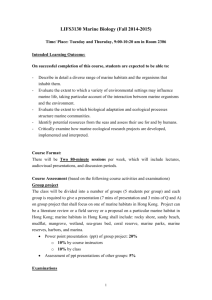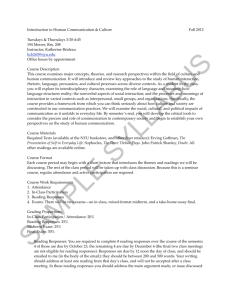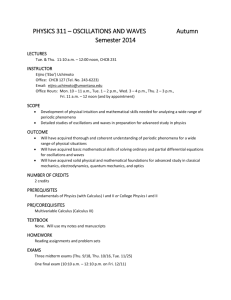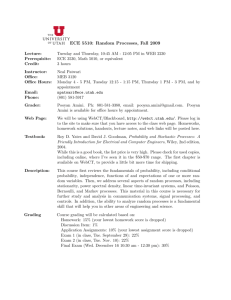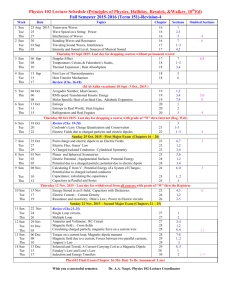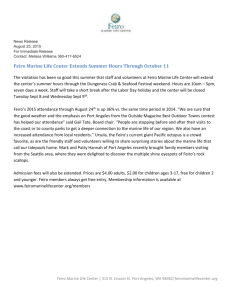LIFS3130 Marine Biology (Fall 2015
advertisement
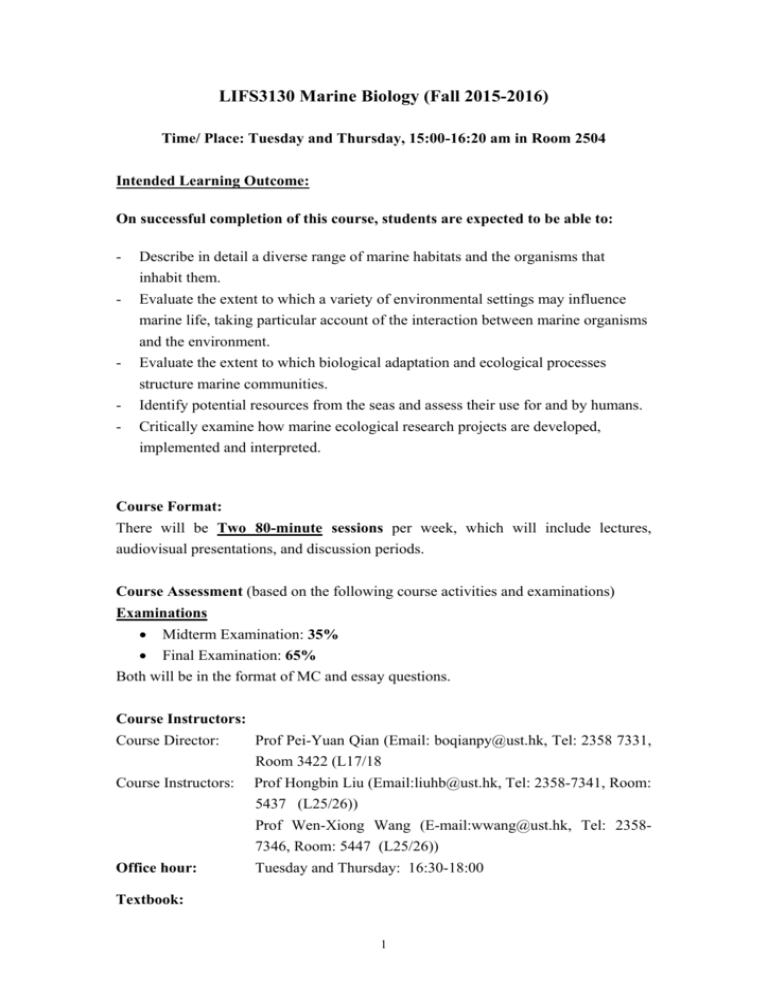
LIFS3130 Marine Biology (Fall 2015-2016) Time/ Place: Tuesday and Thursday, 15:00-16:20 am in Room 2504 Intended Learning Outcome: On successful completion of this course, students are expected to be able to: - - Describe in detail a diverse range of marine habitats and the organisms that inhabit them. Evaluate the extent to which a variety of environmental settings may influence marine life, taking particular account of the interaction between marine organisms and the environment. Evaluate the extent to which biological adaptation and ecological processes structure marine communities. Identify potential resources from the seas and assess their use for and by humans. Critically examine how marine ecological research projects are developed, implemented and interpreted. Course Format: There will be Two 80-minute sessions per week, which will include lectures, audiovisual presentations, and discussion periods. Course Assessment (based on the following course activities and examinations) Examinations Midterm Examination: 35% Final Examination: 65% Both will be in the format of MC and essay questions. Course Instructors: Course Director: Prof Pei-Yuan Qian (Email: boqianpy@ust.hk, Tel: 2358 7331, Room 3422 (L17/18 Course Instructors: Prof Hongbin Liu (Email:liuhb@ust.hk, Tel: 2358-7341, Room: 5437 (L25/26)) Prof Wen-Xiong Wang (E-mail:wwang@ust.hk, Tel: 23587346, Room: 5447 (L25/26)) Office hour: Tuesday and Thursday: 16:30-18:00 Textbook: 1 Peter Castro & Michael E. Hubber (2013) Marine Biology, The 9th Edition, McGrawHill Education (Asia) Major Reference: James W. Nybakken (2005). Marine Biology: an ecological approach. Harper Collins College publishers, New York. 6th Edition. Jan A. Pechenik (2010). Biology of Invertebrates. 4th Edition, McGraw-Hill Book Company, 2 Tentative Lecture Outline and Schedule: Lecture Topic Instructor Part 1: Introduction to Marine Environment 1) 1 Sept (Tue) Introduction to Marine Environment Qian 2) 3 Sept (Thu) Special public holiday 3) 8 Sept (Tue) Physical and Chemical Oceanography Qian 4) 10 Sept (Thu) Hydrothermal vent and Cold seeps Qian Part 2: Introduction of Marine organisms 5) 15 Sept (Tue) Biodiversity of Marine Life Qian 6) 17 Sept (Thu) Sponges Qian 7) 22 Sept (Tue) Coral Reef Ecology Qian 8) 24 Sept (Thu) Coral-microbe symbiosis Qian 9) 29 Sept (Tue) Mid-term Exam Qian 10) 1 Oct (Thu) Public Holiday 11) 6 Oct (Tue) Marine Mollusca Wang 12) 8 Oct (Thu) Shellfish farming and seafood safety Wang 13) 13 Oct (Tue) Arthropoda Wang 14) 15 Oct (Thu) Echinodermata Wang 15) 20 Oct (Tue) Marine Fishes and Fisheries Liu 16) 22 Oct (Thu) Marine Mammals Liu Part 3: Communities and Ecosystems 3 17) 27 Oct (Tue) Microbial diversity, function and processes Liu 18) 29 Oct (Thu) Liu 19) 3 Nov (Tue) 20) 5 Nov (Thu) Biogeochemical cycles in marine ecosystems & Primary Producers (phytoplankton and macroalgae) Primary Productivity in Ocean 21) 10 Nov (Tue) Liu 22) 12 Nov (Thu) Harmful Algal Blooms and Possible Mechanisms Zooplankton and planktonic food webs 23) 17 Nov (Tue) Subtidal benthic communities Liu 24) 19 Nov (Thu) Intertidal habitats Liu 25) 24 Nov (Tue) Estuary Liu 26) 26 Nov (Thu) Mangrove and Wetland Liu 27) 1 Dec (Tue) Study Break 4 Liu Liu Liu

